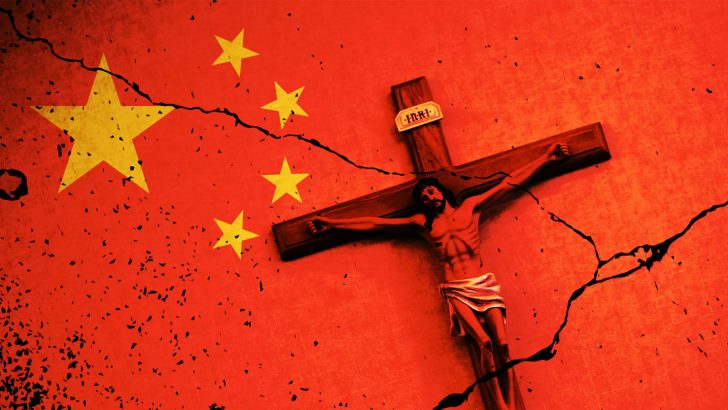The View
As I sit to write, the news of John Hume’s death has just broken. There is one word that comes to mind when I think of John: courage. With Pat, his wonderful wife, at his side, ever encouraging, ever supporting, he marched through dangerous, hostile, challenging, territory to bring us peace here in Ireland.
Without him, I am sure, we would have suffered many more years of terror, indescribable horror, and desperation. He lived his life well. May his great soul rest in peace, and, as we thank Pat for her loving contribution to his work, may his family have the comfort of knowing that he brought peace and hope to millions of people, not just in Ireland but across the world.
Another great man is struggling on, trying to find the way to deal with the repression, the denial of human rights, the terror, the genocide that is the reality of life in China today for those who do not subscribe to the Chinese Communist Party’s ideology. Pope Francis is trying to negotiate his way through a massive dilemma, staying absolutely faithful to the Gospel in all respects.
Complexity
The complexity of the Chinese situation cannot be overstated. I wrote last month about the abuse of ethnic minorities in China, the concentration camps to which millions have been taken, the forced sterilisation, organ harvesting, genocide and slave labour being endured by millions.
The world is beginning to recognise these scandalous, gross breaches of human rights and to call them out for what they are, to condemn the Chinese Communist Party for its inhumanity and its arrogance. I have no doubt that Pope Francis is absolutely aware of what is going on in China, and I am equally sure that he grieves for all who suffer there, and who have suffered for so long as they strive to live a life in a community of religion, be it the Church, or other denominations or faiths. I hope that he will find the right words to speak with authority and compassion directly to the Chinese Communist Party and its leaders, and to condemn in the strongest terms the terrible abuses we see today in China. That might be described as the easy bit.
The Chinese Communist Party has long been determined to destroy religion”
For in so doing Francis must seek to help, not to endanger further the 10-12 million Catholics who live there. Theirs has been a long and difficult journey.
Another Jesuit priest, an extraordinary character called Matteo Ricci, went over 400 years years ago to bring the Faith to China.
There is a wonderful book based on his writings and journals, The Wise Man from the West. A scholar and a profoundly pastoral man, ever respectful of the culture of the Chinese people even when it was contrary to everything he believed, he died in 1610, much respected in Beijing, celebrated because of his scholarship and his way of life. Yet he and those to whom he ministered had suffered terribly.
Since he died in 1610, Chinese Catholics have continued to suffer much, as they did in his lifetime.
Over centuries of repression Christians have been tortured, imprisoned and killed, their churches destroyed.
The Chinese Communist Party has long been determined to destroy religion. All loyalty belongs, under Chinese ideology, to the state and there is no space for those who affirm that God is, and that his law is pre-eminent. There is no space for freedom of belief and conscience, for genuine faith, in the Chinese Communist Party’s China.
****
The Chinese Catholic church became an ‘underground Church’, functioning in the most difficult circumstances, then split, as some of its number chose to align themselves with a new ‘patriotic Church’ and were granted some rights by the Chinese government. It was a church, subject to a hostile state and divided in a way that I do not really think we can comprehend.
Pope Francis has been trying to find a way forward, to heal that split, to create diplomatic relations with China, so that progress can be made. His much criticised, yet unpublished provisional agreement with the Chinese government in 2018 (which related to the appointment of bishops in China and which is said to give the Chinese a say in who is appointed bishop, subject to Pope Francis’ final decision), was an attempt to use the channels of diplomacy to achieve initial change.
Francis is trying to negotiate a way in which the Church in China can be safe”
This was despite Canon Law which provides that “for the future no rights or privileges be conceded to civil authorities in regard to the election, nomination or presentation of bishoprics”.
American Jesuit, Fr Paul Mariani, wrote of the risks attaching to that agreement thus: “It would be naive in the extreme to think that the Chinese government wants any positive outcomes for the Church.” Yet, if we are to achieve change, then we have to deal with the Chinese government. Francis is trying to negotiate a way in which the Church in China can be safe. The alternative – pure condemnation of human rights abuses has some effect, but it is not enough.
Plight
Pastor Martin Niemuller, who was originally an anti-semitic Nazi supporter in Germany, spoke up against the Nazis as he began to realise what they were doing, and he ended up in Sachsenhausen concentration camp. Many years later, trying to alert the world to what happens when we ignore the plight of others he explained what had happened in simple terms:
First they came for the communists
And I did not speak out
Because I was not a communist.
Then they came for the socialists
And I did not speak out
Because I was not a socialist.
Then they came for the trade unionists
And I did not speak out
Because I was not a trade unionist.
Then they came for the Jews
And I did not speak out
Because I was not a Jew.
Then they came for me
And there was no one left
To speak out for me.
The Vatican’s Secretariat of State is working in profoundly challenging and sensitive terrain to build a relationship with China at a time when the world is becoming aware of the atrocities inherent in the current government of China and is beginning to take action against China.
Cardinal Pietro Parolin, Archbishop Paul Gallagher and others in the Secretariat of State must do the work of diplomacy in the way that diplomats do that work: quietly, carefully, thinking deeply, identifying the possible consequences of proposed action and weighing all up, seeking to discern the best possible way forward in the context of what is happening today.
It is the most difficult of work. It is the work of God. This is Francis’ challenge.
We must pray that they will be enlightened by the Holy Spirit in their work and that what seems impossible now will become a reality – that the Church in China may be set free and that her people will have that freedom of religion which we take so much for granted today.


 Nuala O’Loan
Nuala O’Loan Photo Illustration by Emil Lendof/The Daily Beast
Photo Illustration by Emil Lendof/The Daily Beast 